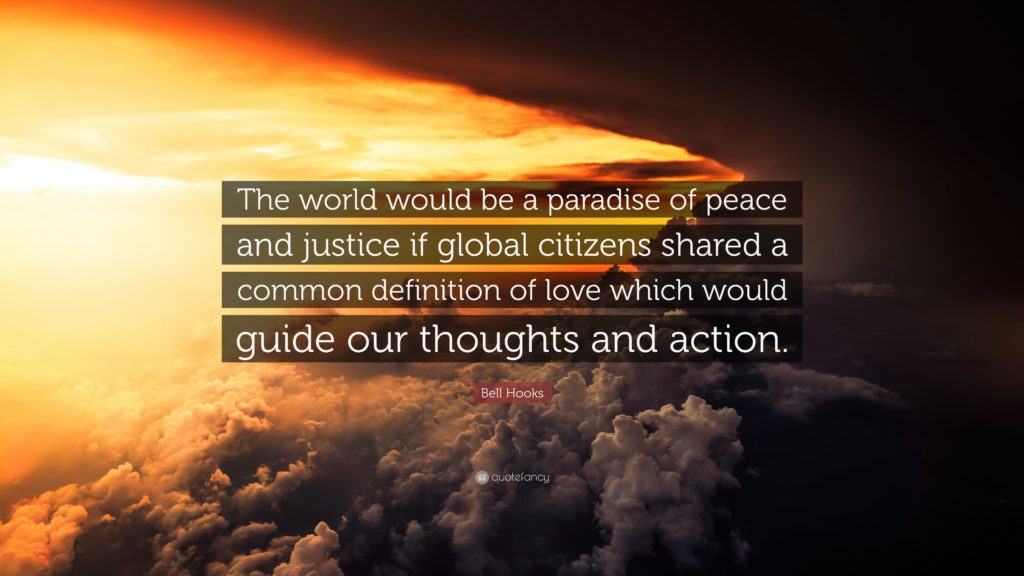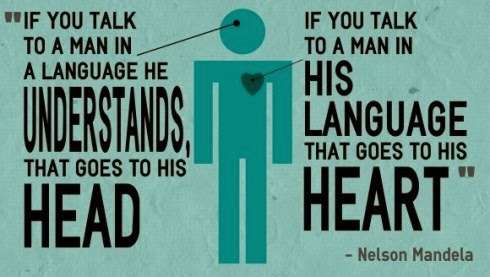
Having global fluency goes beyond basic etiquette to avoid a cultural faux pas or learning a foreign language. It’s the ability to understand viewpoints beyond your own as you think critically about complex problems that affect everyone on the planet. Higher global fluency gives room to form meaningful connections with people, no matter what their race, nationality, or socio-economic background. You can increase your global fluency with these four steps. (Estimated reading time: 5 minutes)
“Local minded people will never understand global minded goals.”
— Unknown
One of the first educational toys I received as a child was a world globe. I took great pleasure in spinning it on its axis and admiring the colors of each continent as they floated on the vast blue oceans, without noticing the names of each place.
One day, my mother sat with me and began orienting me. “This is where we are,” she said, pointing to the Arabian Peninsula, “and this is where Disney World is,” while pointing to North America. By using landmarks that were familiar to a 6-year-old, she gave me a sense of the world and planted the seeds of curiosity.
This drive to learn about other countries has been an invaluable tool, especially in situations where I’ve been immersed in a multicultural setting. It has also been a burden at times, especially when around people who are provincial in their thinking and have a limited perspective of the world.
There’s a certain charm in having strong roots in where we’ve come from and holding on to the traditions, customs, and practices of our cultures. Staying local allows us to stay informed about the latest developments in our neighborhoods, and can inspire us to take steps to enhance and improve our surroundings.

Yet, when we stay too close to home, we run the risk of becoming ignorant and developing a myopic vision. This is a disadvantage in a world where people are more connected than humans have ever been. Rapid improvements in technology and the affordability of international travel has connected us in ways we often take for granted.
The internet and social media have given us a massive platform for conversation and allows us to gain insight and witness world events as they unfold from every corner of the globe. We get to see common issues through the diverse lens of others, and this enriches our personal views.
An increase in our connectedness has shifted the dynamics in our global community, and as members of it, we must recognize that we are interdependent. Every choice we make on a local scale may have ramifications on a global one.
If you’re aware of your significance, you’re more likely to become a spokesperson for social injustice on both local and global levels. For example, when you know of the injustices of conventional trade in developing countries, you’ll choose products that support decent working conditions, local sustainability, and fair terms of trade for farmers.

When we have high global fluency, and we’re open to others, we’ll see that we have more similarities than differences. We all have the same basic need for love, safety, food, clean water, and if we stay informed about the world, we’ll realize that due to corrupt governments and the wealth divide, too many citizens aren’t having these needs met.
Having global fluency goes beyond basic etiquette to avoid a cultural faux pas, learning a foreign language to better assimilate into a foreign country, or having the know-how to find your way around a new one.
It’s the ability to understand viewpoints beyond your own as you think deeply and critically about complex problems that affect everyone on the planet. You’ll find opportunities, problem-solve, and question what’s truly acceptable and just in our society and take a stand based on what feels right to you.
Most importantly, a higher global fluency gives room to form more profound and meaningful connections with people, no matter what their race, nationality, or socio-economic background. When you understand the nuances and issues of their country of origin, you demonstrate compassion and invite them to open up to you.

Here are four ways to increase your global fluency:
1. Consume both local and international news: It’s easy to stick with news that’s familiar. We prefer to tune in to the local news or read news apps that provide us with useful information like the weather, traffic updates, and local events. But if we want to increase our global fluency, we need to make a conscious effort to step outside our local news bubble and tune in to international news sources that can inform us of issues occurring in other countries. Familiarizing ourselves with international stories gives us perspective on what’s happening in our own backyards.
2. Travel regularly: The quickest way to stimulate fresh thinking and create new mental models is through regular travel outside your locality. Diving into a new environment, whether that be a foreign country or different region of your own, and engaging in their food, art, music, history, and culture, breaks any fixed outlooks and challenges any assumptions we may have. Increasing our knowledge about a completely new place enhances us personally, and opens the doorway to continual learning and innovation, as well as it connecting us to a diverse range of people.
3. Visit different cultural communities in your town: If you’re unable to travel as much as you would like, an alternative option to expose yourself to other ways of living is by visiting neighborhoods and communities in your own city that are dominated by specific ethnic groups. For example, in cosmopolitan cities such as London, there are neighborhoods inhabited by specific populations such as Asian, Caribbean, African, and other Europeans.
Similarly, in New York, you’ll find pockets of ethnic groups all over the cities that include European, Asian, Middle Eastern, and Latin American. Attending festivals, eating at restaurants, and interacting with the people in these areas will broaden your horizons and increase your global fluency.
4. Be open and curious: None of the activities above will create an impression on us if we lack an attitude of openness, curiosity, and tolerance. When we’re curious and passionate about what lies beyond our immediate frontiers, we’ll be naturally inclined to seek knowledge, experiences, and people who shed light on new ways of living and being in the world. For most of us, life is hectic and busy, and we prefer to stick with a routine and what’s familiar. That’s why we need to prioritize practices and occasional adventures that boost our global fluency and gets us out of our bubble.
The former first lady of the U.S., Nancy Reagan, famously said: “There’s a big, wonderful world out there for you. It belongs to you. It’s exciting and stimulating and rewarding. Don’t cheat yourselves out of this promise.” When we decide to step into that big, wonderful world, we’ll fully experience its richness and beauty, and be inspired to make it better and brighter.
All my best in your journey,
Seline

Question for you: Why do you think it’s important to increase global fluency? What are some steps you’re willing to take to enhance your own fluency?
Did you like this post? Sign up below, and I’ll send you more awesome posts like this every week.

Insightful post…thank you for sharing this with us Seline! I think a big part of the problem with the world today is that we have lost sight of how things are from the perspective of others. Knowing how others think and live can help us be less egocentric and I think that is something that can help make global relations better and stronger.